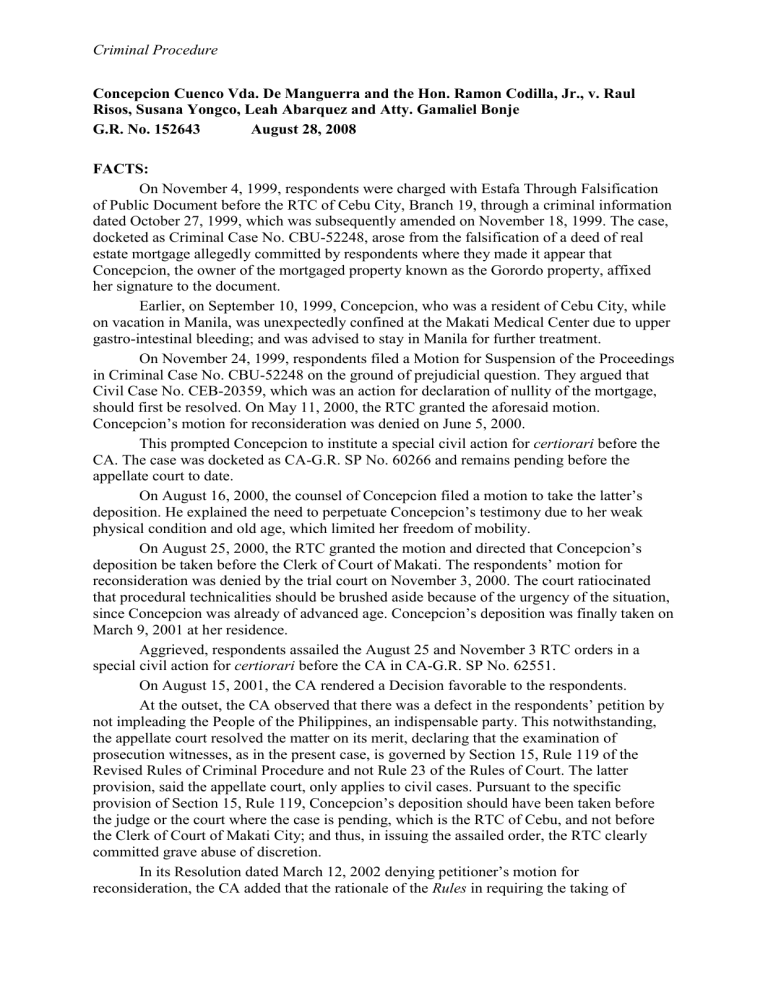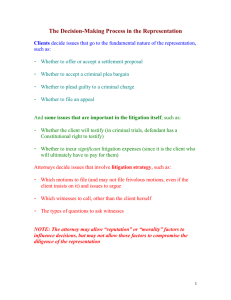
Criminal Procedure Concepcion Cuenco Vda. De Manguerra and the Hon. Ramon Codilla, Jr., v. Raul Risos, Susana Yongco, Leah Abarquez and Atty. Gamaliel Bonje G.R. No. 152643 August 28, 2008 FACTS: On November 4, 1999, respondents were charged with Estafa Through Falsification of Public Document before the RTC of Cebu City, Branch 19, through a criminal information dated October 27, 1999, which was subsequently amended on November 18, 1999. The case, docketed as Criminal Case No. CBU-52248, arose from the falsification of a deed of real estate mortgage allegedly committed by respondents where they made it appear that Concepcion, the owner of the mortgaged property known as the Gorordo property, affixed her signature to the document. Earlier, on September 10, 1999, Concepcion, who was a resident of Cebu City, while on vacation in Manila, was unexpectedly confined at the Makati Medical Center due to upper gastro-intestinal bleeding; and was advised to stay in Manila for further treatment. On November 24, 1999, respondents filed a Motion for Suspension of the Proceedings in Criminal Case No. CBU-52248 on the ground of prejudicial question. They argued that Civil Case No. CEB-20359, which was an action for declaration of nullity of the mortgage, should first be resolved. On May 11, 2000, the RTC granted the aforesaid motion. Concepcion’s motion for reconsideration was denied on June 5, 2000. This prompted Concepcion to institute a special civil action for certiorari before the CA. The case was docketed as CA-G.R. SP No. 60266 and remains pending before the appellate court to date. On August 16, 2000, the counsel of Concepcion filed a motion to take the latter’s deposition. He explained the need to perpetuate Concepcion’s testimony due to her weak physical condition and old age, which limited her freedom of mobility. On August 25, 2000, the RTC granted the motion and directed that Concepcion’s deposition be taken before the Clerk of Court of Makati. The respondents’ motion for reconsideration was denied by the trial court on November 3, 2000. The court ratiocinated that procedural technicalities should be brushed aside because of the urgency of the situation, since Concepcion was already of advanced age. Concepcion’s deposition was finally taken on March 9, 2001 at her residence. Aggrieved, respondents assailed the August 25 and November 3 RTC orders in a special civil action for certiorari before the CA in CA-G.R. SP No. 62551. On August 15, 2001, the CA rendered a Decision favorable to the respondents. At the outset, the CA observed that there was a defect in the respondents’ petition by not impleading the People of the Philippines, an indispensable party. This notwithstanding, the appellate court resolved the matter on its merit, declaring that the examination of prosecution witnesses, as in the present case, is governed by Section 15, Rule 119 of the Revised Rules of Criminal Procedure and not Rule 23 of the Rules of Court. The latter provision, said the appellate court, only applies to civil cases. Pursuant to the specific provision of Section 15, Rule 119, Concepcion’s deposition should have been taken before the judge or the court where the case is pending, which is the RTC of Cebu, and not before the Clerk of Court of Makati City; and thus, in issuing the assailed order, the RTC clearly committed grave abuse of discretion. In its Resolution dated March 12, 2002 denying petitioner’s motion for reconsideration, the CA added that the rationale of the Rules in requiring the taking of Criminal Procedure deposition before the same court is the constitutional right of the accused to meet the witnesses face to face. The appellate court likewise concluded that Rule 23 could not be applied suppletorily because the situation was adequately addressed by a specific provision of the rules of criminal procedure. ISSUE: Whether Rule 23 of the Rules of Court applies to the instant case RULING: It is basic that all witnesses shall give their testimonies at the trial of the case in the presence of the judge. This is especially true in criminal cases in order that the accused may be afforded the opportunity to cross-examine the witnesses pursuant to his constitutional right to confront the witnesses face to face. It also gives the parties and their counsel the chance to propound such questions as they deem material and necessary to support their position or to test the credibility of said witnesses. Lastly, this rule enables the judge to observe the witnesses’ demeanor. This rule, however, is not absolute. As exceptions, Rules 23 to 28 of the Rules of Court provide for the different modes of discovery that may be resorted to by a party to an action. These rules are adopted either to perpetuate the testimonies of witnesses or as modes of discovery. In criminal proceedings, Sections 12, 13 and 15, Rule 119 of the Revised Rules of Criminal Procedure, which took effect on December 1, 2000, allow the conditional examination of both the defense and prosecution witnesses. In the case at bench, in issue is the examination of a prosecution witness, who, according to the petitioners, was too sick to travel and appear before the trial court. Section 15 of Rule 119 thus comes into play, and it provides: Section 15. Examination of witness for the prosecution. – When it satisfactorily appears that a witness for the prosecution is too sick or infirm to appear at the trial as directed by the court, or has to leave the Philippines with no definite date of returning, he may forthwith be conditionally examined before the court where the case is pending. Such examination, in the presence of the accused, or in his absence after reasonable notice to attend the examination has been served on him, shall be conducted in the same manner as an examination at the trial. Failure or refusal of the accused to attend the examination after notice shall be considered a waiver. The statement taken may be admitted in behalf of or against the accused.

